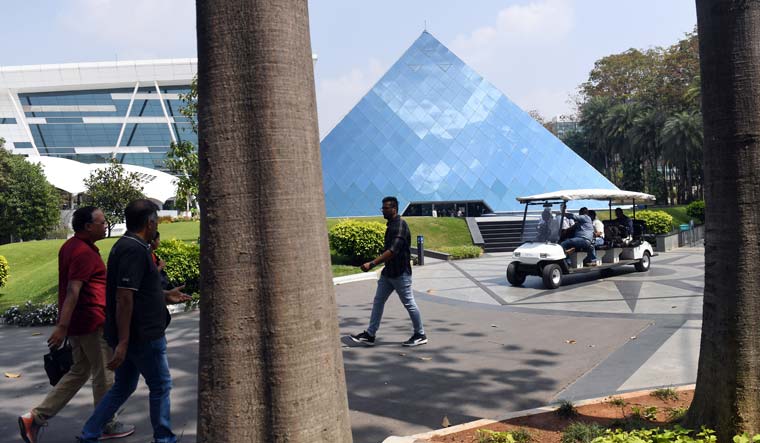The US move to suspend work visas like H-1B till year-end may hurt the Indian IT firms' margins as they will have to resort to more expensive local hiring to replace Indians, according to analysts.
US President Donald Trump signed a proclamation to suspend issuing of H-1B visas—popular among Indian IT professionals—along with other foreign work visas for the rest of the year, aimed at helping millions of Americans who have lost their jobs due to the current economic crisis.
The order that comes into effect on June 24, is expected to impact several American and Indian companies who were issued H-1B visas by the US government for the fiscal year 2021 beginning October 1.
A section of analysts thinks that Indian IT companies which have been ramping up local hiring can aid them in mitigating the impact of this development.
Credit rating agency ICRA, in its report, said the temporary suspension will be "mildly negative" for the Indian IT services sector considering their high dependence on such visas.
"However, the suspension will not affect those already in the US on the visas...Currently, Indian IT services is the major beneficiary of the H-1B visa programme. USCIS issued a total of 3,88,403 H-1B visas during FY2019 (October 2018 to September 2019 period) including fresh and renewals of which share of India stood 71.7 per cent," it added.
"This proclamation will have negative implications for the Indian IT sector, particularly on margins...(we) believe companies with lower levels of locally hired workers will see a greater negative impact," a Goldman Sachs Equity Research report said.
The report noted that Indian IT outsourcing companies have been consistently working towards reducing their reliance on H-1B/L1 visas since 2017, and focusing on the locally hired workforce to create more jobs in the US economy.
Centrum Broking IT analyst Madhu Babu, however, said there would be no impact of the development on Indian IT companies' financial performance.
"The dependence of Indian IT companies on work visas has been coming down. With COVID-19, there are travel restrictions and it is not clear how many people would have travelled given the current circumstances. Also, people on H-1B visas in the US can seek extensions. So, we don''t see an impact," Babu said.
On BSE, IT stocks of companies like TCS and Infosys were trading higher than the previous close.
India's largest IT firm Tata Consultancy Services—in its FY20 annual report—had said it has hired 20,000 people in the US in the last five years. Infosys too had committed to hiring 10,000 locals in the US.
In FY2019, the total approved H-1B petitions for initial employment for the top seven Indian companies formed only 6 per cent of aggregate 85,000 H-1B petitions subject to cap, as per available estimates.
The Goldman Sachs report said local hires account for as much as 45-70 per cent of the employees in the US for the top 5 Indian IT service firms, reducing the dependence on H1-B visas.
It cited the example of Infosys, saying in FY2016, only 35 per cent of the Bengaluru-headquartered company's US-based workforce was locally hired.
This has now been ramped up to 63 per cent.
Interestingly, US Citizenship and Immigration Services (USCIS) had in April said that nearly 2.75 lakh unique registrations were submitted during the initial registration period.
Apart from Indian IT companies, global tech giants like Google and others also hire Indians for high-skill jobs in the US.
The development comes at a time when the COVID-19 pandemic has disrupted businesses globally. IT companies have had to enable work from home for a significant portion of their workforce to ensure business continuity for clients.
TCS, Infosys and HCL Technologies were not available for comments.
On Twitter, topics like Indian IT and H1B visas were among the top trends.
Google CEO Sunder Pichai has also expressed disappointment over the proclamation and said he would stand with immigrants and work to expand opportunity for all. Human rights bodies, in particular those working among immigrant communities, as well many American lawmakers have also urged Trump to revoke the suspension.
IT industry body Nasscom has termed the proclamation as "misguided" and "harmful to the US economy" and said this could possibly force more work to be performed offshore since the local talent is not available in the country.
Tech Mahindra MD and CEO CP Gurnani said the Indian IT industry has prepared itself for immigration challenges in past as well.
"So in this context, we can say that India Inc has become a lot more 'Aatmanirbhar' or self-reliant. From a Tech Mahindra standpoint, we have prepared ourselves on different fronts," he added.
Gurnani said the company has been hiring locally, opened new centres in the US and has been reskilling and upskilling a lot more engineers there.
"Moreover, we strongly believe that the 'future of work' will be hybrid, a mix of both of physical and remote, and the overall application count for H-1B visas from India will continue to deaccelerate," he added.
Industry association CII expressed disappointment with the proclamation and pointed out that businesses across the US rely on temporary visas to supplement their local hiring efforts and enable highly-skilled and talented professionals from around the world to enhance America's competitiveness on the global stage.
Referring to one of its reports, CII said 155 Indian companies have invested nearly $22 billion in the US economy and generated or safeguarded 125,000 jobs. They also fund research, innovation, CSR and reskilling programmes in the US, it said.
"They have also been supporting the US during the spread of the COVID 19 pandemic - retooling their American manufacturing units to produce essentials, providing pharmaceutical and healthcare assistance for drug discovery and clinical trials in the US...," Chandrajit Banerjee, Director General of CII, said.
It is more important than ever before to collaborate and work together to aid global economic recovery during this challenging time, he added.



